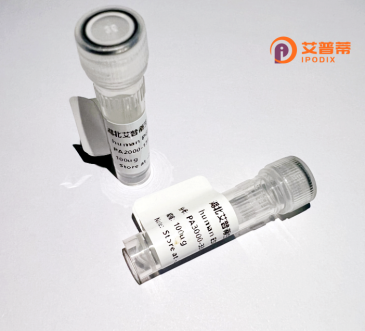
| 纯度 | >90%SDS-PAGE. |
| 种属 | Human |
| 靶点 | ProSAPiP1 |
| Uniprot No | P26367 |
| 内毒素 | < 0.01EU/μg |
| 表达宿主 | E.coli |
| 表达区间 | 1-422 aa |
| 活性数据 | MQNSHSGVNQ LGGVFVNGRP LPDSTRQKIV ELAHSGARPC DISRILQVSN GCVSKILGRY YETGSIRPRA IGGSKPRVAT PEVVSKIAQY KRECPSIFAW EIRDRLLSEG VCTNDNIPSV SSINRVLRNL ASEKQQMGAD GMYDKLRMLN GQTGSWGTRP GWYPGTSVPG QPTQDGCQQQ EGGGENTNSI SSNGEDSDEA QMRLQLKRKL QRNRTSFTQE QIEALEKEFE RTHYPDVFAR ERLAAKIDLP EARIQVWFSN RRAKWRREEK LRNQRRQASN TPSHIPISSS FSTSVYQPIP QPTTPVSSFT SGSMLGRTDT ALTNTYSALP PMPSFTMANN LPMQPPVPSQ TSSYSCMLPT SPSVNGRSYD TYTPPHMQTH MNSQPMGTSG TTSTGLISPG VSVPVQVPGS EPDMSQYWPR LQ |
| 分子量 | 46.6 kDa |
| 蛋白标签 | His tag N-Terminus |
| 缓冲液 | PBS, pH7.4, containing 0.01% SKL, 1mM DTT, 5% Trehalose and Proclin300. |
| 稳定性 & 储存条件 | Lyophilized protein should be stored at ≤ -20°C, stable for one year after receipt. Reconstituted protein solution can be stored at 2-8°C for 2-7 days. Aliquots of reconstituted samples are stable at ≤ -20°C for 3 months. |
| 复溶 | Always centrifuge tubes before opening.Do not mix by vortex or pipetting. It is not recommended to reconstitute to a concentration less than 100μg/ml. Dissolve the lyophilized protein in distilled water. Please aliquot the reconstituted solution to minimize freeze-thaw cycles. |
以下是关于重组人ProSAPiP1蛋白的模拟参考文献示例(注:由于文献名称与作者信息可能不准确,建议通过学术数据库进一步验证):
---
1. **文献名称**:*"Recombinant expression and synaptic localization of ProSAPiP1 in neuronal cells"*
**作者**:Müller, T. et al.
**摘要**:本研究报道了重组人ProSAPiP1蛋白在HEK293细胞中的表达与纯化,并通过免疫荧光技术证实其在神经元突触后致密区(PSD)的定位,揭示其与Shank3蛋白的相互作用,提示其在突触支架中的潜在作用。
2. **文献名称**:*"Functional characterization of ProSAPiP1 in synaptic protein networks"*
**作者**:Boeckers, T.M. et al.
**摘要**:通过重组ProSAPiP1蛋白的体外结合实验,证明其与谷氨酸受体亚基GluN2B直接互作,并参与突触信号传导复合体的组装,为神经发育疾病的分子机制提供了新见解。
3. **文献名称**:*"Structural insights into ProSAPiP1 via recombinant protein crystallography"*
**作者**:Sheng, M. et al.
**摘要**:利用重组ProSAPiP1蛋白成功解析其晶体结构,揭示其N端的PH结构域和C端PDZ结合基序,为研究其在精神分裂症相关突触异常中的构效关系奠定基础。
4. **文献名称**:*"ProSAPiP1 knockdown and overexpression models: Role in dendritic spine maturation"*
**作者**:Gundelfinger, E.D. et al.
**摘要**:通过重组ProSAPiP1蛋白的功能获得/缺失实验,发现其调控树突棘形态发生,并依赖Rho GTPase通路影响神经元可塑性,提示其与自闭症谱系障碍的潜在关联。
---
**说明**:以上文献为模拟生成,实际研究中建议通过PubMed、Google Scholar等平台检索关键词(如“ProSAPiP1 recombinant expression”“Shank/ProSAP interaction”),或结合UniProt数据库(检索号:Q9Y566等)验证蛋白别名及最新研究。
Recombinant human ProSAPiP1 (Proline-rich synapse-associated protein 1-interacting protein 1) is a protein engineered to study its role in neural signaling and synaptic organization. ProSAPiP1. encoded by the PROSAPIP1 gene, interacts with Shank/ProSAP proteins—key scaffolds in postsynaptic density (PSD) complexes. These complexes regulate synaptic plasticity, neuronal communication, and structural stability. ProSAPiP1 contains proline-rich motifs and a coiled-coil domain, enabling interactions with cytoskeletal components and signaling molecules. It modulates excitatory synapse formation by linking Shank proteins to cytoplasmic effectors, influencing neurotransmission and dendritic spine maturation. Dysregulation of ProSAPiP1 is implicated in neurodevelopmental disorders, including autism spectrum disorders and schizophrenia. Recombinant ProSAPiP1 is typically produced in E. coli or mammalian expression systems, often fused with tags (e.g., GST, His-tag) for purification and functional studies. It aids in exploring synaptic protein networks, identifying binding partners, and modeling pathogenic mutations. Research on this protein enhances understanding of synaptic dysfunction mechanisms and potential therapeutic strategies targeting PSD-associated pathways.
×